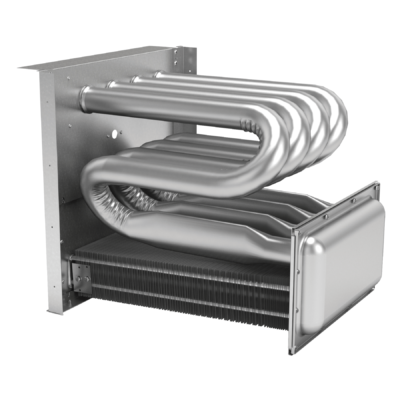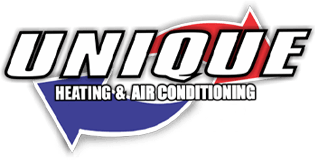
Heating your home depends on generating and transferring heat to various rooms within your home. The heat exchanger is the component of your HVAC system that is responsible for this important job. Let’s explore what a heat exchanger is and how it works.
What Is a Heat Exchanger?
By its simplest definition, a heat exchanger transfers heat between two or more liquids. Each liquid is separated by a wall to prevent them from mixing. Sometimes, in an HVAC system, the heat exchange will occur between a gas and a liquid. They can be used for both heating and cooling.
The most common liquid for heating coils is water, steam, or a water-glycol mixture. In cooling coils, it might be chilled water or a refrigerant. As air is heated, it increases the ability to hold moisture. This moisture will be recovered as condensation on the cooling side of the system.
How Does It Work?
In a gas furnace, the heat exchanger is located close to the combustion chamber. In an electric furnace, it is located close to the coil. The heat exchanger is heated by the heat source and warms the air outside. From there, a blower fan distributes the heated air through the ducts.
Some furnaces have two heat exchangers. They have a primary and secondary heat exchanging system. The primary heat exchanger is usually made of aluminized steel, which transfers heat better than one made of stainless steel. In modern furnaces, heat exchangers are made of a series of tubes. The more tubes in the system, the quicker it will heat your home. The secondary heat exchanger has a set of fins and usually completes the cycle of turning the exhaust gases into water.
Why Does a Heat Exchanger Crack?
Sometimes, your heat exchanger can crack over time. This happens because the metal expands every time the thermostat senses that it needs to trigger the gas burner or heating coil. When the extra heat is no longer needed and the burners turn off, the heat exchanger begins to cool down.
The process of heating and cooling with every heating cycle can lead to metal cracking. When this happens, it is possible for the gases that are combustion products to escape the system and leak out into the ductwork. If this happens, carbon monoxide can enter the room, creating a dangerous situation. Some things can cause your heat exchanger to overheat, such as failing to change your filters, improper adjustment, or if the gas valves become worn out. Improperly sized ductwork can also cause this to happen.
The average life expectancy of a heat exchanger is about 10-20 years. Some furnace manufacturers offer a lifetime warranty, which is often a good indicator that they are made from quality materials. In some cases, a heat exchanger might not last 10 years if it was made from inferior materials and is of a poor design.
How Do You Know If Your Heat Exchanger Is Cracked?
One of the most dangerous situations that can occur is if you have an older furnace and are not aware that the heat exchanger has developed a crack. Newer furnaces have sensors that will shut the unit down if carbon monoxide is detected. Many will not turn back on until the problem is fixed by a qualified professional. At Unique Heating & Air Conditioning Inc. our highly trained technicians can fix your heat exchanger.
Even if your furnace is newer and has sensors that will shut it down if something is wrong, you should install working carbon monoxide monitors throughout your home. The best way to know if your heat exchanger is in good shape is to have regular maintenance on your furnace. This is one of the items that a qualified professional will check as a part of routine service. Having seasonal maintenance on your furnace is the best way to make sure your furnace is running as efficiently and safely as possible.
Unique Heating & Air Conditioning Inc. offers services to residents and commercial customers in Northglenn, CO, and the surrounding areas. We offer HVAC installation, repair, and maintenance services, and we also offer indoor air quality services. Our highly trained and experienced technicians can install and repair many major brands, including Rheem, Trane, Goodman, Bryant, Amana, Carrier, and Lennox. Contact us if you need help with your heat exchanger or other components of your HVAC system.





